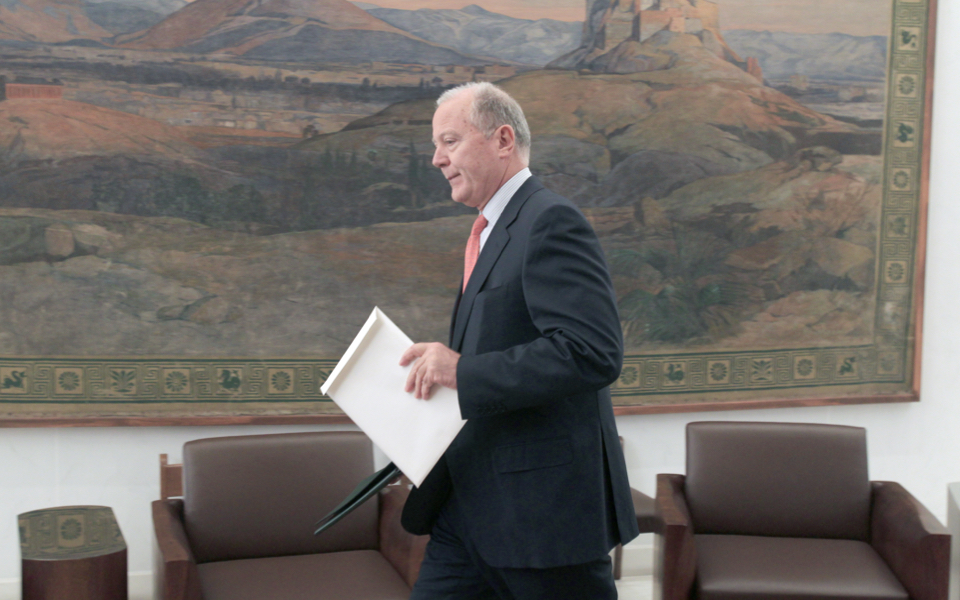The story behind Greece’s ‘unprecedented fiscal derailment’ in 2009

The publication of Yiannis Papathanasiou’s new book, “8 Months,” by Livanis, on the period he served as finance and economy minister in the conservative government of Costas Karamanlis (2004-09), has reignited the debate regarding responsibility for Greece’s fiscal collapse in 2009-10.
In short, the book represents a fresh effort by Karamanlis allies to pass the blame onto his Socialist successor, George Papandreou. The issue has been analyzed repeatedly – occasionally with some objectivity, more often than not with selective use of evidence and monumental inaccuracies.
A report sent by Bank of Greece analysts to its governor, Giorgos Provopoulos, on October 6, 2009, which was just two days after PASOK’s electoral victory, sheds a glaring light on Karamanlis’s real fiscal legacy. The authors’ conclusion, presented in italics for emphasis, was that on the basis of the available data and developments, “we are facing an unprecedented fiscal derailment,” which, they said, “could only be explained to a very small degree by a slump in economic activity.” It is “absolutely certain,” they added, that the country’s fiscal position “is unsustainable.
Spending and revenues
According to the document, which was recently seen by Kathimerini and concerns developments in public finances in the first nine months of 2009, Greece’s fiscal data showed a significant deterioration in September, the month before the general elections that propelled Papandreou – signatory of Greece’s first bailout deal with foreign creditors – to power.
Comparing data for September 2009 with that for September 2008, the report, which was written by the Bank of Greece’s economic research department, monthly budget expenditure rose by 25 percent, while monthly revenues declined 24.2 percent.
Because of that development, the report noted, the deficit in September 2009 grew to 1.5 percent of gross domestic product, against a monthly average of 1 percent in the previous eight months. The fiscal deficit on a cash basis, as a result, was calculated at 9.7 percent of GDP in the first nine months of the year and the primary deficit on a cash basis was at 5.9 percent of GDP.
According to the report, budget expenditure in January-September 2009 “rose by 16.4 percent” compared with the same period the previous year, “because of an increase in primary expenditure” (expenditure excluding debt servicing). More specifically, this spike in expenditure was attributed to an increase in social benefits (social solidarity benefit, unemployment benefit, income support for large families etc), pay rises granted to judicial officials and state doctors, an increase in subsidies for social security funds, and so on.
The report also notes as “pending” (in the last quarter) pension increases for pensioners of the farmers’ fund, OGA, and hikes in the EKAS social solidarity benefit, as well as various state obligations amounting to 15 billion euros. Subsidies to the country’s four biggest social security funds (IKA, OAEE, NAT and OGA) were to come to 11.03 billion euros by the end of the year, or 2.36 billion euros more than foreseen in the budget.
No cuts
Referring to government commitments to introduce cutbacks, the Bank of Greece report notes that the decisions “made from the start of the year to the present regarding expenditure not only show a complete absence of efforts to contain expenditure but point in the opposite direction.”
Regarding revenues, the authors of the report saw the possibility of a “slight rebound” in the last quarter. However, there was only a “small” chance that the state would manage to collect revenues foreseen from the legalization of certain illegal building additions worth 1.1 billion euros (which Papathanasiou makes much of because the measure was later abolished by PASOK), from the ETAK property tax (1.6 billion euros) and from the “containment of tax evasion” (400 million euros – quotation marks are included in the BoG report).
However, the authors noted, even if the money from the ETAK tax and the building fees were collected, the deficit would shrink by just 1.2 percent of GDP.
Deficit ‘prediction’
After analyzing the data, the writers of the Bank of Greece report made the following prediction: “Based on the above developments, the central government deficit on a cash basis is estimated to come to between 30 and 35 billion euros, or 12 to 14 percent of GDP” for the year as a whole. If September’s trends continued, they noted, the deficit “may even approach” 15 percent of GDP. Therefore, they argued, “the assessments put forward to Eurostat on September 30 in the framework of the excessive deficit procedure were extremely optimistic.”
In another part of the report, they noted that “while all the numbers for the nine-month period indicate a deficit double that in 2008, the notification to Eurostat estimates that the budget will remain basically unchanged.” This is a reference to the assessment of the Karamanlis government, just a few days before its electoral defeat, that the 2009 deficit would come to 5.9 percent of GDP (at more or less equal levels with 2008, before the upward revisions that came later).
Papathanasiou claims – in his new book, as well as on other occasions – that as a projection for the entire year, this assessment does not constitute statistical data and therefore cannot be deemed false. However, given that the deficit had already reached 10 percent in cash terms by the end of September, the assessment that it would drop to 6 percent by the end of the year can hardly be seen as honest.
The wider picture
As Papathanasiou and others in Karamanlis’s circle correctly claim, Papandreou and his top lieutenants had adopted the usual nihilistic stance in opposition. They offered no consensus whatsoever, not even for positive moves like the concession of Piraeus Port’s cargo terminal to China’s Cosco, while claiming that what was needed to restart the economy was the traditional Keynesian recipe (translation: more public expenditure).
But PASOK did not come into government until October 2009. It was not George Papandreou who increased public expenditure from 45.1 percent of GDP in 2006 to 54.1 percent of GDP three years later. It was not he who made the country’s debt shoot up from 181.5 billion euros in 2003 to 301 billion euros in 2009.





